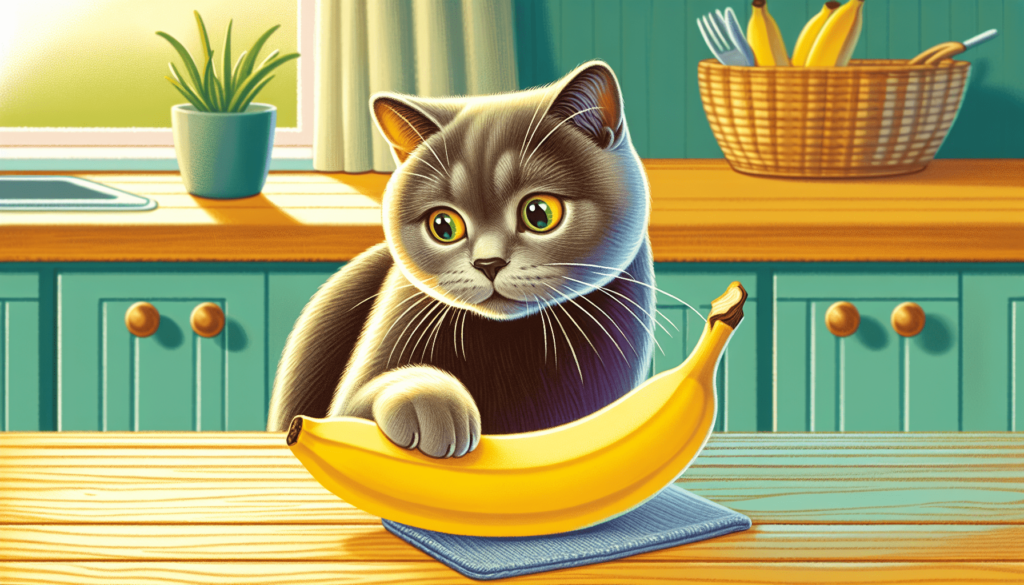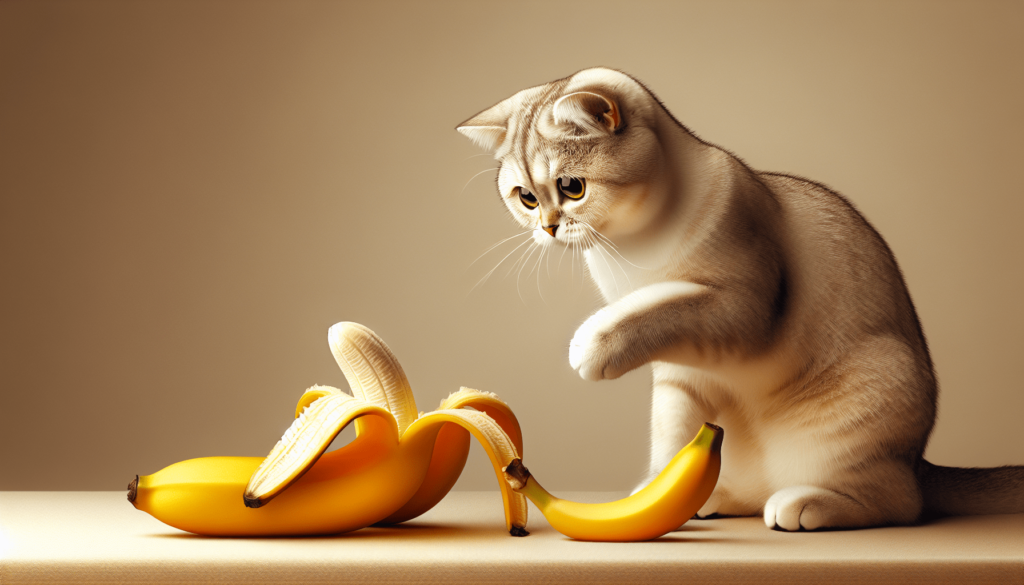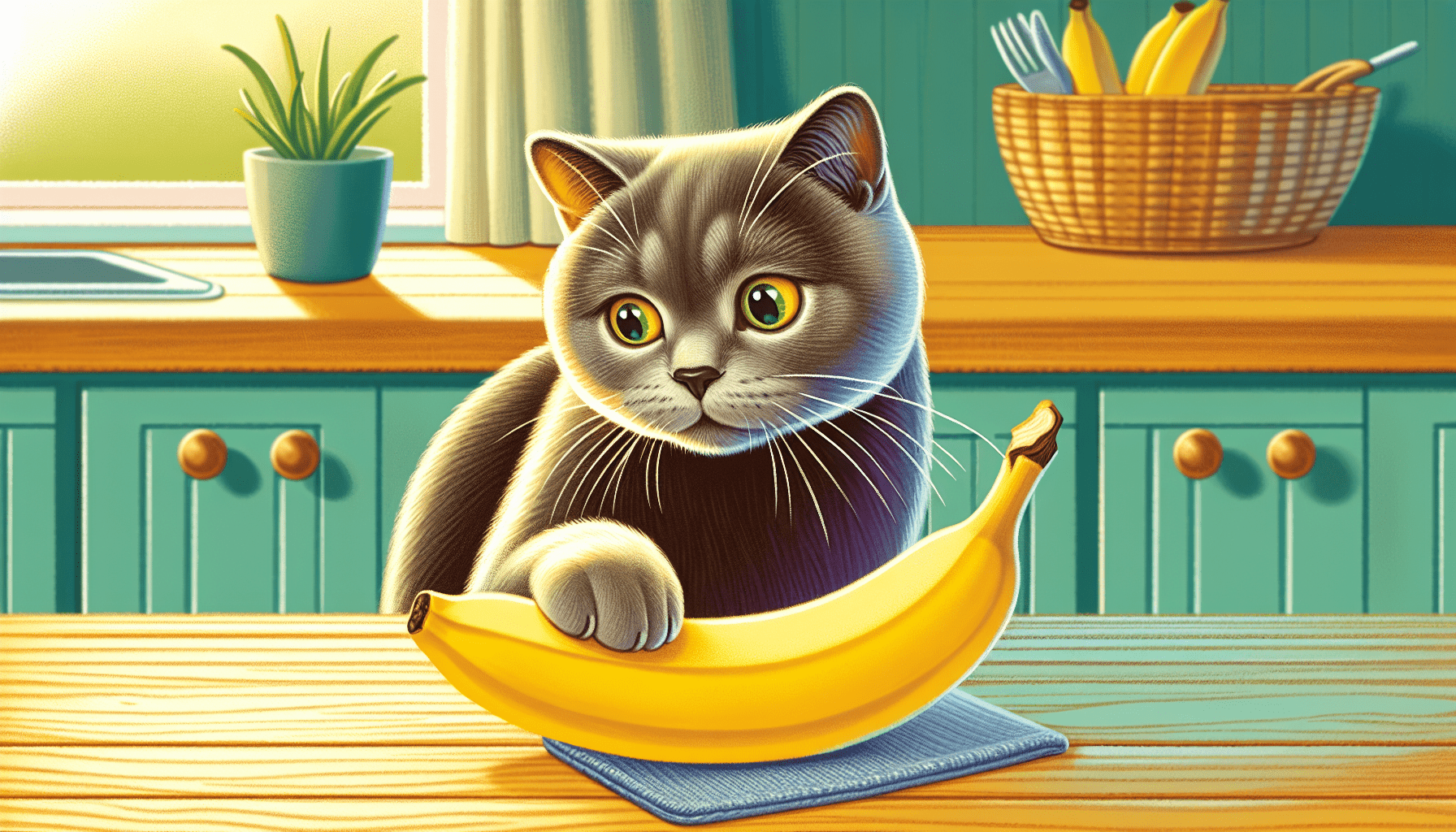Do you ever find yourself wondering if cats can eat bananas? You might be surprised to learn that the answer is yes! While bananas may not be a typical part of a cat’s diet, they can actually be a safe and healthy treat in moderation. However, there are a few things you should keep in mind before sharing this yellow fruit with your feline friend. In this article, we’ll explore the benefits and potential risks of feeding bananas to cats, as well as provide some guidelines on how to do it safely. So, if you’ve ever wondered about the compatibility of cats and bananas, keep reading to find out!

Understanding Cats’ Dietary Requirements
Cats are obligate carnivores, which means their bodies are adapted to thrive on a diet primarily consisting of meat. While they require nutrients that can be found in plant matter, their systems are designed to efficiently digest and utilize animal proteins. Understanding the dietary requirements of cats is essential for providing them with a balanced and nutritious diet.
Omnivores vs Carnivores
Unlike humans and some other animals, cats are classified as obligate carnivores, meaning they require nutrients found predominantly in animal tissues to maintain optimum health. Their bodies have evolved to efficiently digest and metabolize meat-based proteins and fats. While some may argue that cats are omnivores, it is important to recognize that their nutritional needs are largely met through the consumption of animal proteins.
A Cat’s Requirement for Protein
Protein is a vital component of a cat’s diet and plays a crucial role in their overall health and wellbeing. Cats require high levels of dietary protein compared to many other animals due to their unique metabolism. Protein is essential for maintaining muscle mass, supporting healthy growth and development, and ensuring proper functioning of organs and bodily systems. Lack of adequate protein can lead to various health issues, including muscle wasting and weakened immune function.
Limitations in Cats’ Digestive Systems
Cats have a relatively short digestive tract, which is an adaptation that allows them to efficiently digest and absorb nutrients from meat-based diets. Their stomachs have a higher acidity level compared to omnivores, which aids in the breakdown of animal proteins. Additionally, cats lack certain enzymes necessary for the digestion of plant matter, making it challenging for them to extract nutrients from carbohydrates and fibers commonly found in plant-based foods.
Nutritional Composition of Bananas
Understanding the nutritional composition of bananas can help determine their suitability for cats as a dietary addition. While bananas are a popular fruit for humans, their nutritional profile might not align perfectly with a cat’s dietary needs.
Carbohydrates
Bananas are a rich source of carbohydrates, primarily in the form of sugars. This can provide a quick burst of energy but is not an essential component of a cat’s diet. Cats have a limited ability to metabolize carbohydrates and derive most of their energy from proteins. Therefore, the high carbohydrate content in bananas may not be as beneficial for cats as it is for humans.
Fiber
Bananas also contain fiber, which is important for maintaining healthy digestion. Fiber can aid in regulating bowel movements and preventing constipation. While cats do require some fiber in their diet, it is typically obtained from the fur and feathers of their prey rather than plant sources. Therefore, while the fiber content in bananas may have some benefits, it should not be relied upon as a primary source of fiber for cats.
Vitamins and Minerals
Bananas are known for their abundance of vitamins and minerals. They are particularly rich in potassium, vitamin C, and vitamin B6. These nutrients play essential roles in various bodily functions, including electrolyte balance, immune system function, and energy metabolism. While these vitamins and minerals are important for cats, they can usually be obtained from their regular diet and do not necessarily require supplementation through bananas.
Are Bananas Safe for Cats
Before introducing any new food into a cat’s diet, it is important to consider their ability to digest and tolerate it. While bananas are generally safe for human consumption, their impact on cats may differ.
Can cats digest bananas
Cats have a unique digestive system that is optimized for processing meat-based proteins. While they may be able to digest small amounts of plant matter, their ability to extract nutrients from carbohydrates and fibers is limited. Therefore, while cats may physically be able to digest bananas, their bodies may not be able to efficiently utilize the nutrients found in them.
Potential allergic reactions in cats
Just like humans, cats can have allergies to certain foods, including bananas. Signs of an allergic reaction in cats can include itching, skin irritation, digestive upset, and respiratory issues. If your cat shows any of these symptoms after consuming bananas, it is advisable to discontinue feeding them and consult a veterinarian.
Are banana peels safe for cats
Banana peels are not recommended for consumption by cats. The outer peel of a banana is not only difficult for cats to digest but also poses a potential choking hazard. Additionally, banana peels may contain pesticide residue or other contaminants if not properly washed, which can be harmful to cats if ingested.
Potential Health Benefits of Bananas for Cats
While cats may not require bananas as a part of their regular diet, there are potential health benefits that can be derived from the nutrients present in them.
Potential benefits of dietary fibers
The fiber content in bananas can aid in maintaining healthy digestion for cats. Although cats primarily obtain fiber from the fur and feathers of their prey, adding small amounts of fruits such as bananas to their diet may contribute to improved bowel movements and overall digestive health. However, it is important to ensure that the fiber content in bananas does not exceed the cat’s overall dietary requirements.
Potential benefits of vitamins and minerals
Bananas contain various vitamins and minerals that are beneficial for cats. The vitamins and minerals found in bananas may contribute to better immune function, improved energy metabolism, and electrolyte balance. However, it is essential to note that cats typically obtain these nutrients from their regular diet, and excessive supplementation through bananas may not be necessary.
Impact on cat’s hydration
Bananas have a high water content, which can contribute to a cat’s hydration. Adequate hydration is crucial for maintaining healthy kidney function and overall wellbeing. However, it should be noted that cats are naturally designed to obtain most of their hydration from the moisture content of their prey. Therefore, while bananas may provide some hydration benefits, they should not substitute for fresh water availability at all times.

Potential Hazards of Feeding Bananas to Cats
While there may be some potential benefits to feeding bananas to cats, it is important to be aware of the potential hazards associated with this practice.
Risk of choking
Bananas, particularly when given in large chunks, pose a choking hazard for cats. The soft texture of the fruit can potentially become lodged in the cat’s throat, leading to respiratory distress. It is crucial to ensure that bananas are cut into small, manageable pieces before feeding them to cats to minimize the risk of choking.
Intestinal blockage from banana peels
As mentioned earlier, banana peels are not safe for cats to consume. Ingesting banana peels can lead to intestinal blockages, which may require surgical intervention to remove. To prevent any potential harm, make sure to discard banana peels properly and keep them out of your cat’s reach.
Impact of sugar content on cats’ health
Bananas contain a significant amount of natural sugars, which can be detrimental to a cat’s health if consumed in excess. Cats are not designed to handle large amounts of sugar in their diet and may experience weight gain, dental issues, and even the development of diabetes. It is crucial to limit the consumption of bananas or any other sugary foods to maintain a balanced and healthy diet for your cat.
Correct Portioning of Bananas for Cats
If you decide to incorporate bananas into your cat’s diet, it is crucial to determine the appropriate portion size and frequency of feeding.
Ideal portion sizes
The portion size of bananas for cats should be small and appropriate for their size and age. As a general guideline, a teaspoon-sized portion of mashed banana, or a couple of small slices, can be given to cats as an occasional treat. It is important to remember that bananas should not constitute a significant portion of a cat’s overall diet.
Frequency of feeding bananas to cats
Bananas should be fed to cats in moderation and as an occasional treat. They are not a necessary component of a cat’s diet and their consumption should be kept to a minimum. Offering bananas once or twice a week as a small reward or treat can be a suitable frequency.
Consideration of the cat’s overall diet
When incorporating bananas into a cat’s diet, it is important to consider their overall nutritional requirements. Cats require a well-balanced diet that primarily consists of animal proteins. Bananas should never replace meat-based proteins or essential nutrients that are necessary for their overall health and wellbeing. Always consult with a veterinarian to ensure that your cat’s diet remains nutritionally balanced.
How to Introduce Bananas Into Cats’ Diet
When introducing bananas into your cat’s diet, it is important to proceed with caution and closely monitor their response.
Watching for signs of digestive discomfort
After giving your cat a small portion of bananas for the first time, observe for any signs of digestive discomfort. These may include vomiting, diarrhea, or changes in litter box habits. If any of these symptoms occur, discontinue feeding bananas immediately and consult with a veterinarian.
Gradually increasing portion sizes
If your cat tolerates small amounts of bananas well, you may gradually increase the portion sizes over time. However, it is crucial to continue monitoring their digestion and overall health to ensure they can handle larger quantities without any adverse effects.
Ensuring dietary variety
While bananas may be a safe and occasional treat for cats, it is important to remember that dietary variety is crucial for their overall health. Cats thrive on a diverse range of animal proteins, so it is essential to prioritize a species-appropriate diet that includes a variety of meat-based proteins and essential nutrients.
Alternatives to Bananas for Cats
If you are looking to provide your cat with a treat or snack, there are several alternative options that are safe and potentially more beneficial for their health.
Other fruits safe for cats
Some cats may enjoy the taste of other fruits that are safe for their consumption. Small portions of fruits such as apples, blueberries, or melons can be offered as occasional treats. However, always ensure that you research the specific fruit in question, as not all fruits are safe for cats to consume.
Vegetable alternatives
Vegetables can also be a healthy addition to a cat’s diet. Cooked and mashed sweet potatoes, pumpkin, or carrots can provide additional nutrients and dietary fiber. However, it is important to remember that vegetables should not replace animal proteins as the primary source of nutrition for cats.
Meat-based treats
Cats are obligate carnivores, so offering them meat-based treats is one of the best ways to satisfy their dietary needs. There are a variety of commercially available cat treats that are specifically formulated to provide essential nutrients and proteins. These treats are designed to support a cat’s overall health while still offering a delicious reward.
Observing Cats After Feeding Bananas
After feeding your cat bananas or any other new food, it is important to observe them for any changes or reactions.
Changes in digestion and bowel movements
Monitor your cat’s digestion and bowel movements after consuming bananas. Look for any signs of gastrointestinal distress, such as vomiting, diarrhea, or changes in appetite. If any abnormal or concerning symptoms occur, discontinue feeding bananas and consult with a veterinarian.
Monitoring for signs of allergic reactions
Keep a close eye on your cat for any signs of allergic reactions after consuming bananas. These can include itching, skin irritation, hives, or respiratory issues. If any of these symptoms appear, refrain from feeding bananas and seek immediate veterinary attention.
Behavioral changes
Some cats may experience changes in behavior after consuming certain foods. Monitor your cat’s behavior after feeding them bananas and be attentive to any unusual or abnormal reactions. If you notice any significant changes, it is advisable to consult with a veterinarian.
Consulting with a Veterinarian
When it comes to making dietary decisions for your cat, it is always best to consult with a veterinarian.
Importance of regular check-ups
Regular check-ups with a veterinarian are crucial to ensuring your cat’s overall health and wellbeing. During these visits, you can discuss your cat’s diet and any potential additions or modifications you are considering. A veterinarian can assess your cat’s specific needs and provide guidance to help you make informed decisions.
Consulting vet before introducing new foods into cats’ diets
Before introducing any new foods into your cat’s diet, it is advisable to consult with a veterinarian. They can provide insights into whether bananas or any other specific food item would be suitable for your cat’s digestive system and nutritional requirements. Considering their expertise will help ensure that your cat’s dietary needs are met appropriately.
Seeking prompt medical attention for adverse reactions
If your cat experiences any adverse reactions or health issues after consuming bananas or any other food, seek immediate veterinary attention. Veterinarians have the knowledge and expertise to diagnose and treat any potential health problems that may arise. Prompt action can help prevent any further complications and ensure your cat’s wellbeing.
In conclusion, while cats are primarily carnivorous animals with specific dietary requirements, bananas can be given to them in moderation. It is important to remember that bananas should not be a significant part of a cat’s diet and should not replace essential nutrients derived from meat-based proteins. Before introducing bananas or any new food into your cat’s diet, consult with a veterinarian to ensure their nutritional needs are met and to prevent any potential health risks. By considering their individual requirements and monitoring their response, you can safely incorporate bananas or other suitable treats into your cat’s routine, allowing them to enjoy an occasional taste of this tropical fruit.

